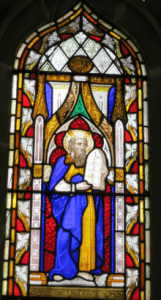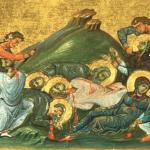 “Trump’s religious advisers have been mostly silent.”
“Trump’s religious advisers have been mostly silent.”
Tom Gjelten wrote these words for NPR just days ago, in his aptly titled article “Trump’s Evangelical Advisers Stand By their Man.” In the aftermath of Trump’s shocking response to Charlottesville, the silence emanating from his Evangelical Advisory Board screamed. It seemed even louder after prominent business leaders and non-profit organizations publicly withdrew support from Trump, resigning advisory positions and cancelling business dealings. In the tweet-heard-round-the-world former republican strategist Matthew Dowd spoke what America seemed to be thinking: “Not a single member of Trump’s Evangelical Council has resigned. We have learned corporate America has a greater moral compass. So so sad.”
When members of the Evangelical Advisory board finally began to respond, their words echoed almost as disturbingly as their silence. Listen to what Johnnie Moore said. “We believe it would be immoral to resign…As faith leaders, we have been given an opportunity to speak directly to various members of the administration, to provide not just policy counsel but personal counsel. We’re personally involved in the lives of all these people, praying for all these people, and answering their questions.”
Did you hear that?
Instead of decrying Trump’s troubling remarks about the “very fine people” shouting Nazi slogans and carrying torches, the Evangelical Advisory Board gave Americans that “most hollow” of modern Christianeeze: “we are praying for you.”
While Denny Burke (not on the advisory council) wrote that Trump’s remarks were “morally bankrupt and completely unacceptable” and called for Christians to speak with conviction and urgency against white supremacy and racism, Jerry Falwell (on the advisory council) praised Trump as a “leader ” who made “bold truthful” statements about Charlottesville.” To be fair, some members of the council have vocally condemned white supremacy and hate groups. Johnnie Moore, as quoted by Christianity Today, protested, “EVERY evangelical I know condemns antisemitism, white nationalism, & supremacism.” Paula White simply said, “white supremacy is evil.”
But the overall response of Trump’s Evangelical Leaders has been slow. It isn’t surprising that NPR summed up evangelical leaders as “reluctant to challenge Trump directly.” Especially since several council members have continued to defend Trump’s comments. Robert Jeffress said: “If we’re going to denounce some racism, we ought to denounce all racism, and I believe that was the point the President was making.” Mark Burns tweeted, “We weren’t electing a pastor, we were electing a president, I don’t look for the president to be our moral compass.”
If you follow my citation links in the last paragraph, you will note most lead back to the Christianity Today article or to religion blogger Zack Hunter’s August 16 article . Both these pieces underscored for me how troubling the Evangelical Advisory Board response has been to Trump and Charlottesville. 10 of the 24 remaining council members (after A.R. Bernard resigned) have simply stayed silent, including James Dobson. Several others have followed the Johnnie Moore approach: “we are praying for you.” “Pray for peace in Charlottesville and across our nation,” said Robert Jeffress. “We need a renewal of grace. God help us,” said Paula White.
Don’t get me wrong. I believe in prayer. I know that prayer has carried me through so many parts of my life. As a historian, I know the stories of countless Christians who valued and pursued prayer (yes–medieval people prayed too! I will get back to that soon…).
Yet I worry that evangelicals have become too comfortable with hiding our inaction behind the guise of prayer. For the good of the church, for the sake of avoiding “division,” we choose silence over action. We comfort ourselves that we are praying.
I can’t hep but think of a very memorable post by Roger Olson: “Evangelical Superstars and Why They Fall.” Olson attempts to diagnose why so many Evangelical leaders (like Mark Driscoll and Jim and Tammy Faye Baker) publicly crash and burn. He argues (rightly so) that our lack of accountability networks for pastors has “created a system of ministry superstars on pedestals that sets them up for failure.” And then he says something even more interesting. He calls for ordinary church-going Christians to pay attention to the signs of pastoral abuse. If you find yourself in a church with a “independent and unaccountable” pastor, Olson writes, “flee.” If you choose to stay and stay silent, perhaps because you don’t want to leave your friends or because you have invested so much in the church, Olson has this clear rebuke. “And if you stay, you are part of the problem. And if he falls, you have yourself partly to blame.” When we stay silent, we become part of the problem.
I find the silent and tepid response of Evangelical leaders to Trump’s “morally bankrupt” (to use Denny Burke’s words) remarks inadequate. I also find their response (or rather, lack of response) quite ironic. Especially since it is 2017.
Let me explain. In two months time, I will be giving a paper at Baylor University’s Institute for Faith and Learning “The Bible and the Reformation” symposium. This isn’t just any Reformation conference. It commemorates 500 years since Martin Luther nailed his 95 Theses to those oh-s0-famous doors in Wittenberg. It is the 500th anniversary of the Protestant Reformation.
American Evangelicals love the Protestant Reformation. From Reformation Day parties (which conveniently substitute for Halloween) to Martin Luther bobble heads, the Reformation is usually one moment in church history with which I can assume comfortable (although usually far from accurate) familiarity from evangelical audiences. Robert Jeffress recently endorsed Erwin Lutzer’s Rescuing the Gospel: The Story and the Significance of the Reformation. His comments sum up well evangelical attitudes toward the Reformation and its most famous figure, Martin Luther. As he writes, “Capturing the pageantry and anger following Martin Luther’s bold stand in Wittenberg, Lutzer has penned what may be his most important book–a book that looks back on the glories of the original Reformation and looks forward to the hope of a new reformation.” For Jeffress, as I would bet for many Evangelicals, the Reformation is a glorious moment in church history. Luther, with his “bold stand in Wittenberg,” epitomizes what individual evangelicals want to be: a bold reformer who speaks the truth of God’s word and brings authentic revival to God’s church.
But Martin Luther did not stay silent. He spoke out against the prevailing establishment and stood for what he believed was right, even though it meant (ultimately) leaving the Catholic faith (resigning?). In his own words, as quoted by Reformation scholar David Whitford (Luther A Guide for the Perplexed), Martin Luther proclaimed to the council at Worms: “Unless I am convinced by the testimony of the Scriptures or by clear reason…I am bound by the Scriptures I have quoted and my conscience is captive to the Word of God. I cannot and I will not retract anything, since it is neither safe nor right to against conscience. I cannot do otherwise, here I stand, may God help me.”
Yes, Tony Suarez, there is a time for Christians to advise kings (or presidents without a moral compass). Yes, Jack Graham, Christians should always love sinners. Yes, Johnnie Moore, Christians should always be praying.
But there is also a time for Christians to speak out and take a stand.
Isn’t it ironic? Modern Evangelical Christians revere Martin Luther for doing the very thing that we are not.













